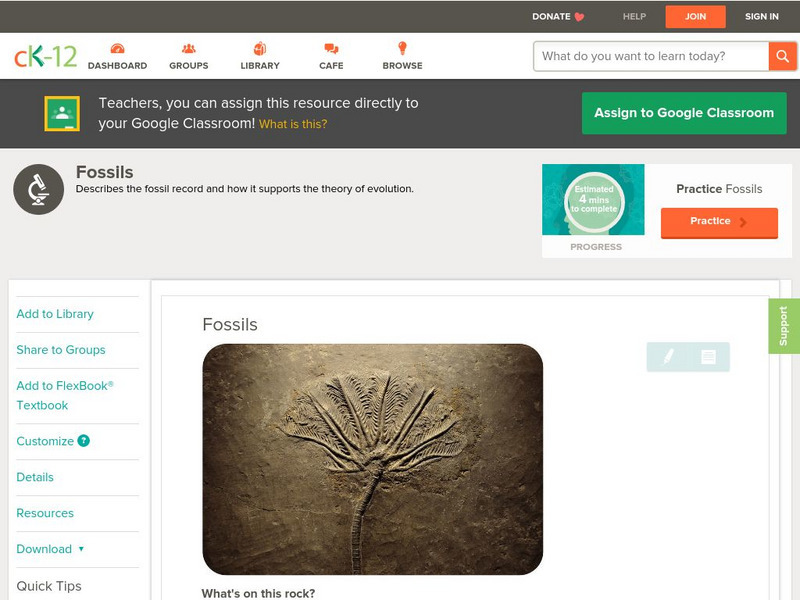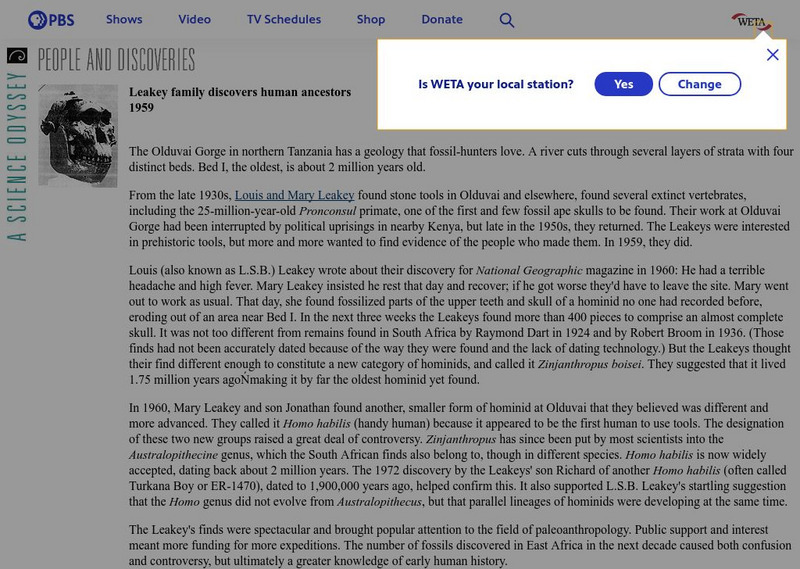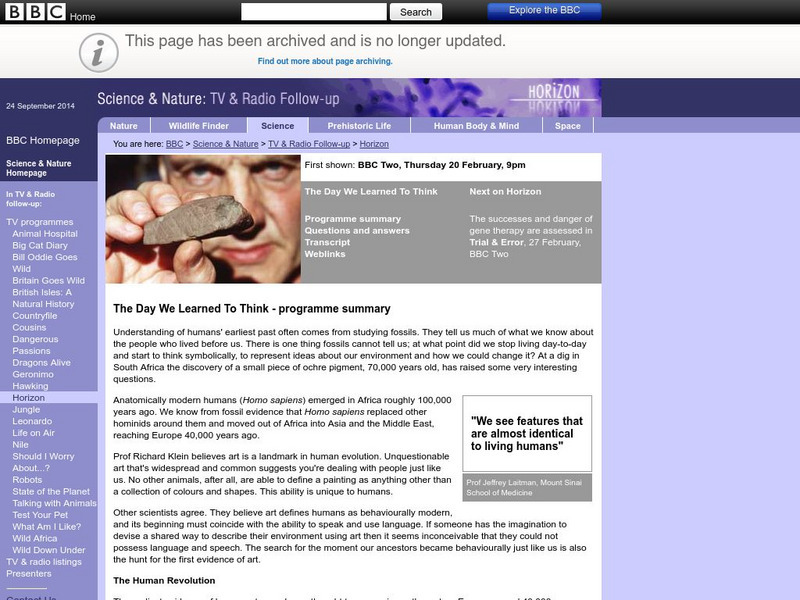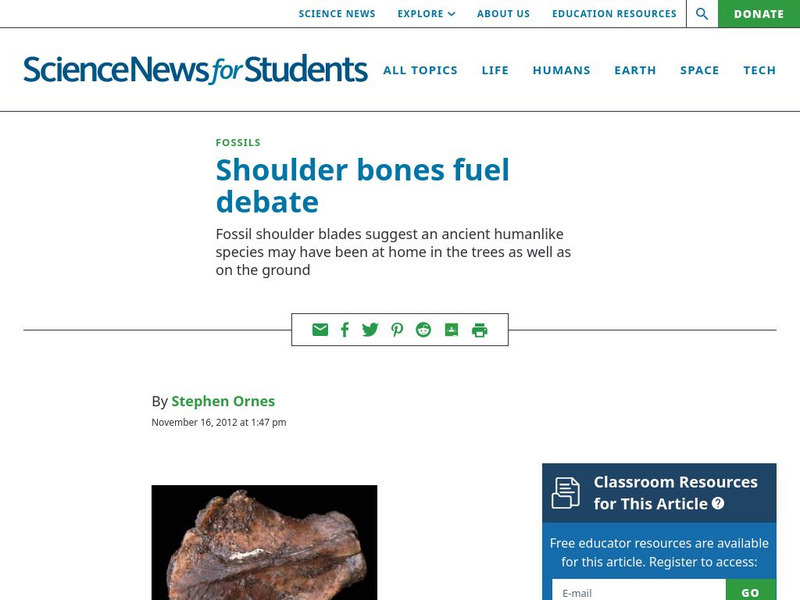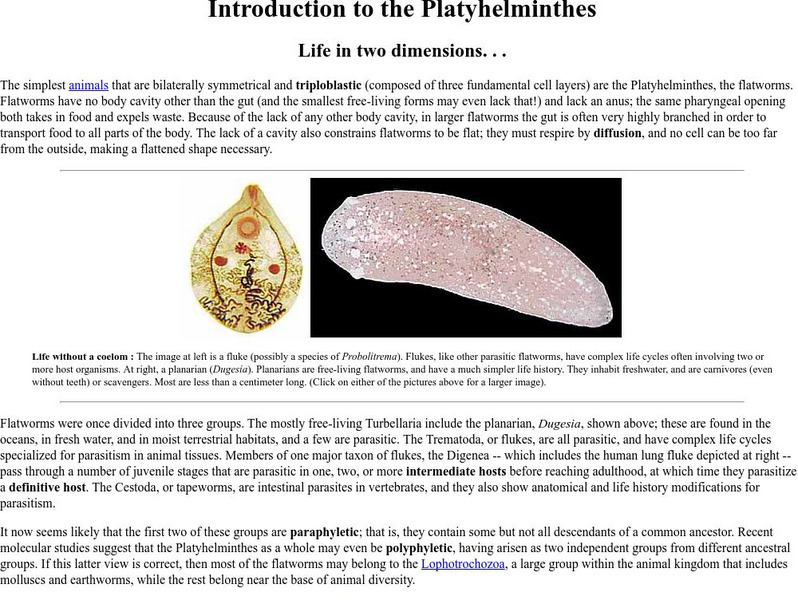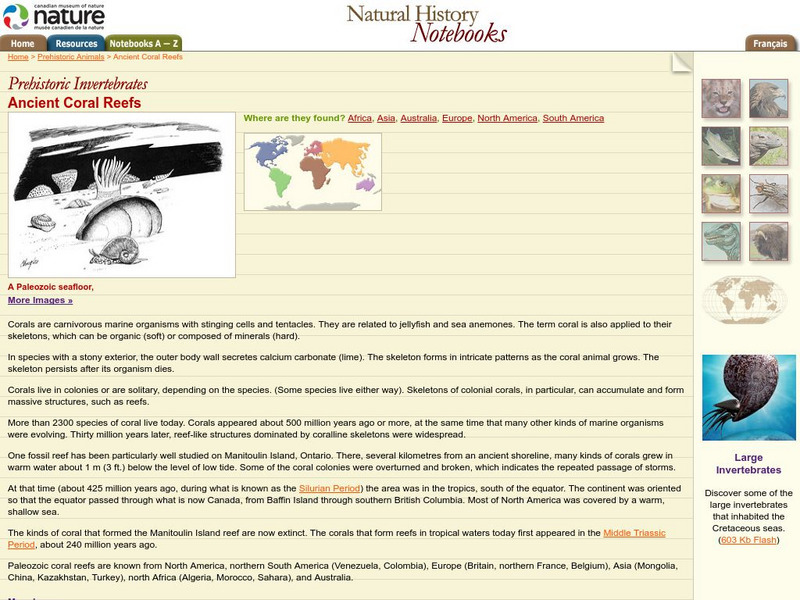Howard Hughes Medical Institute
Hhmi: Bio Interactive: Stickleback Evolution Virtual Lab
This virtual lab uses stickleback fish and fossil specimens to study evolutionary processes and teaches students skills of data collection and analysis.
Texas Education Agency
Texas Gateway: Evidence for Evolution
Get ready to create your own definition based on scientific knowledge of evolution in this tutorial! This tutorial specifically explores the fossil record, cell's evolution, and homologies.
American Institute of Biological Sciences
Action Bioscience: Fossils and the Origin of Whales
Through fossils scientists have been able to study the evolution of whales. Read this article to take a closer look at the details.
CK-12 Foundation
Ck 12: Life Science: Fossils
[Free Registration/Login may be required to access all resource tools.] Fossils are the preserved remains of animals, plants, and other organisms from the distant past. By studying fossils, evidence for evolution is revealed....
Cosmo Learning
Cosmo Learning: Principles of Evolution, Ecology and Behavior
A collection of video lectures introducing beginning biology students to the principles of evolution, ecology, and behavior. The course was taught three times a week for a semester at Yale University. The course discusses concepts of...
Other
Evidence for Evolution: Fossil Record
These pages are part of a site called "Evolution," that accompanies a textbook by the same name. Mark Ridley is the author. In this section he discusses how fossil records provide undeniable examples of evolutionary change.
CPALMS
Florida State University Cpalms: Florida Students: Evolution: Examining the Evidence
Strengthen understanding of how different types of scientific evidence support the theory of evolution, including direct observation, fossils, DNA, biogeography, and comparative anatomy and embryology.
Other
Bio Web Evolution: Homepage
This site from BioWeb Evolution was originally created as a ThinkQuest entry, and it has some good basic information about evolution. This page is on fossils and geologic time.
PBS
Pbs: Leakey Family Discovers Human Ancestors
The PBS site covers the Leakey family and their discoveries in Olduvai Gorge in Tanzania. This information was part of a PBS exploration of human evolution.
Untamed Science
Untamed Science: Biology: Evolution: History of Life: The Cambrian Explosion
Learn about the Earth's evolutionary history during the Cambrian period. [3:25]
PBS
Pbs Learning Media: Whales in the Making
This graphic from Evolution, traces the evolution of whales from land-dwelling mammals to the aquatic creatures we know today. A PDF is included that diagrams the evolutionary process that is believed to have taken place.
Estrella Mountain Community College
Maricopa Community College: Nonvascular Plants and Nonseed Vascular Plants
Very detailed outline describing several aspects of plant diversity, including vascular vs. nonvascular, evolutionary adaptations, homosporous and heterosporous life cycles, and specific information on some ancient species (Lycophytes,...
Science Buddies
Science Buddies: Blast Into the Past Identify T. Rex's Closest Living Relative
Believe it or not, scientists were recently able to recover tissue and partial sequence information for protein molecules from a 68-million-year-old Tyrannosaurus rex fossil. In this genomics science fair project, you will use the T....
Other
Prehistoric Planet: Rock Layers: Timeline of Life on Earth
Offers an easy to understand explanation of the earth's layers and the fossils we find in each layer. It explains how these are interpreted by scientists to represent the evolution of animal and plant life through the geological eras.
BBC
Bbc: Science and Nature: The Day We Learned to Think
A summary of BBC program entitled, "The Day We Learned to Think." Offers a brief look at man's first works of art, early ability to speak, and evolution of intelligence. Offers questions and answers, a program transcript, and various...
Society for Science and the Public
Science News for Students: Shoulder Bones Fuel Debate
A shoulder blade was recently discovered that belonged to a 3-year-old humanlike female who lived more than 3 million years ago. Scientists are studying the fossil to learn whether the creature climbed trees.
University of California
Ucmp: Flatworms, Life in Two Dimensions
A discussion of the fossilized Platyhelminthes that have been found, and offers several different strategies as to how they evolved.
Famous Scientists
Famous Scientists: Charles Lyell
Learn about the works of Charles Lyell, a geologist who studied Earth's history.
University of Kentucky
University of Kentucky: Earth Science Classroom Activities
A collection of links to activities and lessons that could be used for Earth science concepts including the foil record, creating a timeline of Earth's history, plate tectonics, dinosaurs, and the progression of life on Earth.
Smithsonian Institution
National Museum of Natural History: Paleobiology: Geologic Time: The Oligocene
Travel through Earth's history to learn about the Oligocene time period, which is characterized by the appearance of most of the living families of mammals.
Canadian Museum of Nature
Canadian Museum of Nature: Ancient Coral Reefs
The Canadian Museum of Nature provides characteristics and ancient history of global coral reefs.



